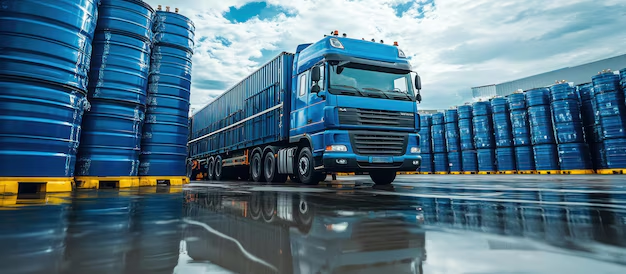In the fast-paced and increasingly regulated world of logistics, transportation, and heavy-duty industries, staying operationally efficient and environmentally compliant is a critical challenge. One powerful solution bridging these two imperatives is Diesel Exhaust Fluid (DEF). As emissions regulations tighten and fuel consumption rises, the strategic delivery and storage of DEF becomes more essential than ever. Bulk DEF delivery is emerging as a key component in managing modern.
Fleets provide both economic and environmental advantages. This article dives deep into the importance of bulk DEF delivery, its benefits, the working process, and how businesses can leverage it to power fleet performance while meeting sustainability goals.
Diesel Exhaust Fluid, commonly known as DEF, is a clear, non-toxic liquid composed of 32.5% urea and 67.5% deionized water. Used in Selective Catalytic Reduction (SCR) systems, DEF plays a critical role in reducing nitrogen oxide (NOx) emissions from diesel engines. These emissions are harmful pollutants known to contribute to smog and respiratory issues. When DEF is injected into the exhaust stream, it reacts with NOx gases and breaks them down into harmless nitrogen and water vapor.
The widespread adoption of SCR technology—mandated by EPA Tier 4 and Euro 6 standards—has made DEF indispensable to diesel engine compliance. From commercial trucks to agricultural machinery, DEF usage is no longer optional but a legal and operational necessity.
While small containers and jugs of DEF are available for retail purchase, they fall short for fleets and industries that use high volumes of diesel fuel. Bulk DEF delivery offers a strategic advantage by ensuring a consistent, cost-effective, and high-quality supply. For operations that rely on heavy-duty diesel equipment, interruptions due to DEF shortages can lead to engine shutdowns, compliance penalties, or operational downtime. Bulk delivery eliminates these risks and brings efficiency to the forefront.
Bulk DEF delivery offers a wide range of benefits that align with the goals of modern operations:
Cost reduction is one of the most immediate advantages. Purchasing DEF in bulk significantly lowers the cost per gallon compared to buying smaller containers. Businesses also save on packaging, labor, and transportation expenses associated with handling and storing smaller units.
Operational efficiency improves as fleets have direct, on-site access to DEF. No more waiting on deliveries or driving to retail suppliers—refueling with DEF becomes as seamless as topping off a diesel tank. This also reduces delays and enhances dispatch reliability.
Environmental sustainability is supported by minimizing plastic waste from disposable containers and reducing the carbon footprint associated with frequent deliveries. Bulk delivery also ensures better storage practices, leading to less product degradation or spillage.
Consistency in quality is guaranteed when DEF is delivered by a certified provider adhering to ISO 22241 standards. Maintaining fluid purity is crucial, as contaminants can damage SCR systems and void warranties.
Scalable storage solutions make bulk delivery attractive to both small and large operations. From 275-gallon totes to 5,000-gallon tanks, businesses can install systems that fit their unique consumption patterns and space constraints.
Bulk DEF delivery is suitable for a broad range of industries, particularly those with large fleets or diesel-powered machinery. Trucking companies, freight logistics providers, public works departments, construction firms, mining operations, and agricultural businesses all stand to benefit.
Municipal services such as sanitation and emergency response also require a consistent DEF supply to maintain equipment uptime. Railroads and marine vessels, which operate under similar emissions restrictions, increasingly depend on DEF infrastructure as well. Even fuel distributors and lubricant resellers often offer DEF as part of their extended services.
Bulk DEF delivery is a streamlined system designed for reliability and minimal human intervention. The process typically begins with a detailed site assessment, where the supplier evaluates your facility’s layout, average consumption rates, and space for tank installation.
Once the assessment is complete, a DEF tank is installed at the site. Tanks vary in size and may be equipped with features such as temperature controls, level monitoring systems, and secure dispensing units. Spill containment solutions are often integrated to comply with safety and environmental standards.
DEF deliveries are then scheduled based on usage trends or through automated monitoring systems that alert suppliers when levels drop. This ensures uninterrupted access to DEF, which is vital for 24/7 operations.
DEF is dispensed on-site through pumping systems or nozzles similar to standard diesel refueling stations. Some setups also support fleet card integration and volume tracking, allowing for precise inventory management.

DEF is sensitive to contamination and extreme temperatures. Best practices for storage and handling help maintain fluid integrity and ensure SCR systems function optimally. Dedicated tanks and dispensing equipment must be used—never repurpose containers that have previously held fuel, oil, or chemicals.
Regular cleaning of tanks and dispensing lines is essential to prevent bacterial growth or particulate intrusion. DEF should be stored between 12°F and 86°F; freezing at lower temperatures is reversible, but overheating can degrade the solution. Heated and insulated tanks are available for regions with extreme climates.
Monitoring DEF expiration dates is equally important. When stored properly, DEF has a shelf life of up to two years, but poor conditions can shorten its usability significantly.
The success of a bulk DEF program hinges on selecting a trustworthy supplier. A reputable DEF delivery partner should provide an ISO 22241-certified product, ensuring compatibility with all SCR systems. Flexibility in delivery options is also critical. Whether you need scheduled weekly fills or demand-based services, the supplier should adapt to your operation.
Technical support for tank setup, system integration, and equipment maintenance adds further value. Suppliers that offer emergency delivery services help prevent costly downtime. Transparent pricing models and consistent quality are non-negotiable traits when evaluating DEF partners.
DEF is not only a performance enhancer—it’s a legal requirement in most modern diesel vehicles. Regulatory bodies such as the Environmental Protection Agency (EPA), California Air Resources Board (CARB), and European authorities enforce strict NOx emissions limits. Using DEF enables compliance with these rules while maintaining engine efficiency.
Failing to maintain DEF availability can result in engine derating, shutdowns, and legal penalties. Using contaminated DEF can damage emission control systems and void manufacturer warranties. By contrast, a robust bulk DEF strategy ensures continuous compliance and smooth operations.
Fleet managers are increasingly viewing DEF as a strategic asset. Bulk DEF systems integrate into broader fleet management platforms, providing visibility into consumption, cost control, and refill scheduling. Smart tank monitoring and automated alerts simplify inventory tracking, while mobile dispensing units enhance field refueling capabilities.
Forward-thinking companies are pairing bulk DEF with sustainability metrics to improve ESG (Environmental, Social, and Governance) performance. Reducing plastic waste and harmful emissions not only benefits the planet but also enhances brand reputation and stakeholder confidence.
There are several misconceptions surrounding DEF that hinder its adoption. For example, some believe DEF is a fuel additive—it’s not. DEF is never mixed with diesel fuel; it’s injected separately into the exhaust stream.
Another myth is that freezing renders DEF unusable. In truth, DEF can safely thaw and retain its effectiveness. Concerns about shelf life also arise, but with proper storage, DEF remains stable for up to two years. Bulk delivery providers are well-equipped to help manage these variables and debunk such myths with science-backed practices.
Bulk DEF delivery is more than a logistical convenience—it’s a mission-critical investment for businesses aiming to balance operational performance with emissions compliance. From lower costs and enhanced reliability to environmental responsibility and regulatory alignment, the benefits are extensive.
As diesel-powered equipment continues to play a foundational role in modern industry, DEF will remain a core element of fleet strategy. Businesses that invest in proper DEF infrastructure and partner with reliable suppliers will enjoy a competitive edge, reduced downtime, and long-term sustainability.
MyFO: A Digital Disruptor in Modern Wealth Management
What is the shelf life of DEF?
When stored in optimal conditions between 12°F and 86°F, DEF typically has a shelf life of up to two years.
Can DEF freeze, and is it usable afterward?
Yes, DEF freezes at 12°F but can be safely thawed and reused without affecting its effectiveness or chemical composition.
Is bulk DEF delivery suitable for small fleets?
Yes, bulk DEF solutions can be scaled to accommodate small, medium, and large fleets, with tank sizes and delivery schedules tailored accordingly.
Do all diesel vehicles require DEF?
Most modern diesel vehicles equipped with SCR systems require DEF to meet emissions standards, including trucks, buses, tractors, and off-road equipment.
How does bulk DEF delivery contribute to cost savings?
It reduces per-gallon pricing, minimizes downtime, cuts packaging and labor costs, and streamlines operations through on-site access and automated monitoring.

